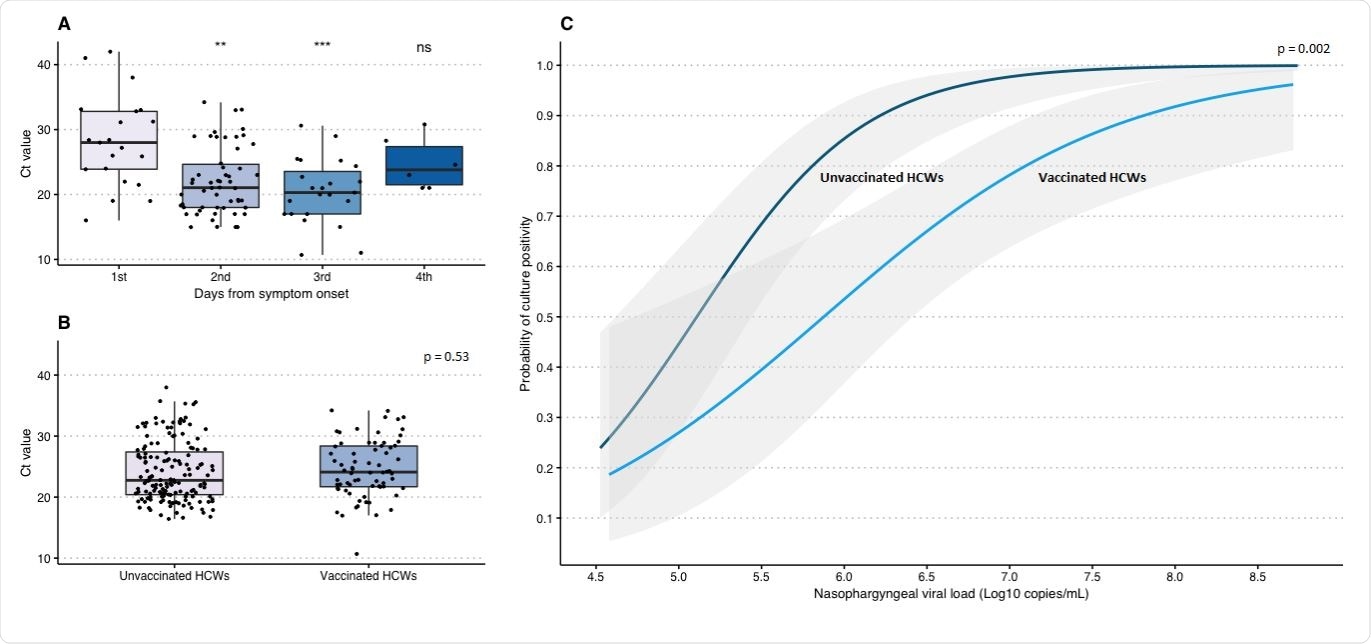Severe acute respiratory syndrome coronavirus 2 (SARS-CoV-2) vaccines have proven effective at preventing COVID-19-related mortality and illness. Since no vaccine is 100% effective, breakthrough infections are likely to occur. New research by a group of scientists at Erasmus Medical Center and Radboud University in the Netherlands looked at vaccine-breakthrough infections in a large group of vaccinated healthcare workers (HCWs).

 *Important notice: medRxiv publishes preliminary scientific reports that are not peer-reviewed and, therefore, should not be regarded as conclusive, guide clinical practice/health-related behavior, or treated as established information.
*Important notice: medRxiv publishes preliminary scientific reports that are not peer-reviewed and, therefore, should not be regarded as conclusive, guide clinical practice/health-related behavior, or treated as established information.
Vaccine breakthroughs
When COVID-19 immunizations opened up, health care workers (HCWs) were among the leading groups to be inoculated and achieve high vaccine coverage. As a result, enlisted vaccines have been highly effective in preventing clinically significant coronavirus disease 2019 (COVID-19), brought about by SARS-CoV-2. Some vaccine recipients, however, develop mild breakthrough infections after receiving the vaccine. The current research analyzed the virological characteristics of 161 (0.65%) vaccine breakthrough infections in a population of 24,706 vaccinated healthcare workers (HCWs). The research is published on the medRxiv* preprint server, while awaiting peer review.
Very little is known about the virological efficacy of SARS-CoV-2 breakthrough infections and the role the inoculation recipients have in the transmission cycle. A comprehensive understanding of the disease is crucial for establishing general health care policies and practices during the pandemic.
The 161 breakthrough infections were reported among HCWs at two tertiary care hospitals who were immunized with mRNA and viral vector vaccines. Most infections were caused by the SARS-CoV-2 delta variant and virus culture was used as a proxy for infection.
Following the Centers for Disease Control and Prevention case definition, a breakthrough infection is defined as a SARS-CoV-2 infection that occurred more than 14 days after all vaccine doses had been given. A case with symptoms beginning 14 days or more after the last vaccine dose and a case with a previous positive result 45 days or more prior were not considered breakthrough infections.
The increased incidence of breakthrough infections among HCWs was observed simultaneously with an increase in cases in the Dutch population in the month of July 2021.
A SARS-CoV-2 lineage was identified in 126 samples, 90.5% of which had the delta variant. The average age of the healthcare workers who had a breakthrough infection was 25.5 years, and 91% of them were under the age of 50.

SARS-CoV-2 culture positivity and Ct-values in nasopharyngeal samples of health care workers with SARS-CoV-2 breakthrough infections. (A) Ct-values by day from symptom onset (B) Ct-values of HCWs with vaccine breakthrough infections (primarily Delta) compared to Ct-values of HCWs with primary infections (primarily D614G) (C) Probability of culture positivity by nasopharyngeal viral load (Probit Analysis), comparing HCWs with vaccine breakthrough infections (primarily Delta) to HCWs with primary infections (primarily D614G)
No hospitalizations
There were no serious infections, and no hospitalizations were required. The individuals received either an mRNA vaccine or a viral vector vaccine between January and May 2021.
The data may show an overrepresentation of Ad26.COV2.S and BNT162b2 vaccine recipients among the cases, but this study was not designed to assess vaccine effectiveness. Because the indication for a particular vaccine was not random and data on the factors leading to exposure were not collected, potential confounding factors were not taken into account.
After examining the virological kinetics of mild COVID-19 breakthrough infections after vaccination, data showed that the SARS-CoV-2 infectious virus shedding is lower in vaccinated individuals with breakthrough infections (caused mainly by the delta variant) than in unvaccinated individuals with primary infections (caused by the D614G variant). Even so, virus culture was positive in 68.6% of breakthrough infections and Ct-values decreased through the first three days. In spite of virus viability being reduced in breakthrough infections, the infectivity should not be ignored.
Vaccination has been shown to be highly effective at preventing COVID-19-related morbidity and mortality in Phase IV studies, although vaccine effectiveness will not reach 100%. The researchers found that vaccinations are highly effective in preventing severe SARS CoV-2-associated disease, however, vaccinated individuals are still capable of acquiring infection and transmitting it.
Via this study, it was concluded that rare vaccine breakthrough infections do occur, but with the aid of vaccines, the infectious virus load is reduced drastically and can thus help the population in general. However, more intense and broad research might draw better conclusions to these studies.

 *Important notice: medRxiv publishes preliminary scientific reports that are not peer-reviewed and, therefore, should not be regarded as conclusive, guide clinical practice/health-related behavior, or treated as established information.
*Important notice: medRxiv publishes preliminary scientific reports that are not peer-reviewed and, therefore, should not be regarded as conclusive, guide clinical practice/health-related behavior, or treated as established information.
Journal reference:
- Preliminary scientific report.
Virological characteristics of SARS-CoV-2 vaccine breakthrough infections in health care workers Marc C. Shamier, Alma Tostmann, Susanne Bogers, Janet de Wilde, Jeroen IJpelaar, Willemijn A. van der Kleij, Herbert de Jager, Bart L. Haagmans, Richard Molenkamp, Bas. B. Oude Munnink, Carsten van Rossum, Janette Rahamat-Langendoen, Nannet van der Geest, Chantal P. Bleeker-Rovers, Heiman Wertheim, Marion P.G. Koopmans, Corine H. GeurtsvanKessel, medRxiv, 2021.08.20.21262158; doi: https://doi.org/10.1101/2021.08.20.21262158, https://www.medrxiv.org/content/10.1101/2021.08.20.21262158v1